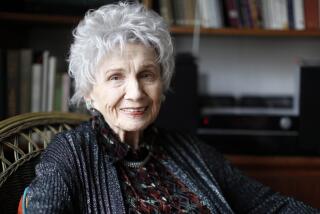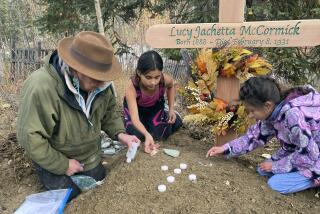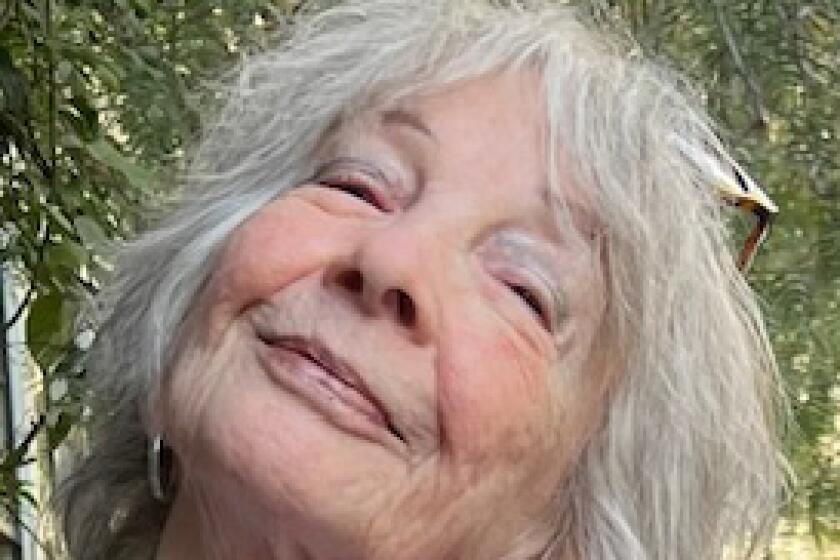Richard Dauenhauer dies at 72; scholar of Tlingit language, culture
A fish doesn’t jump in Tlingit, the native language of indigenous people of Southeast Alaska.
It performs a feat no word in English can adequately express. The verb in Tlingit captures the instant when a fish breaks the surface, the sequence of sounds as it rises and the spray of water that spreads around it.
That some modern-day Alaskans get frustrated as they search for English equivalents can be attributed in part to the work of Richard Dauenhauer, a linguist, anthropologist, playwright and former Alaska poet laureate who died Tuesday of cancer in Juneau, Alaska.
Dauenhauer, 72, made recording, transcribing and advocating for the Tlingit language his life’s work. He trained a cadre of teachers and translators to continue his efforts. He sought not just to revive the fast-disappearing tongue, largely relegated to the thoughts of a few surviving tribal elders, but to win acceptance for its use.
Alaskans can now elect to study Tlingit from kindergarten through college and read translated works of Tlingit oratory. “Everyone who is currently teaching Tlingit has been taught by Richard Dauenhauer,” said Lance Twitchell, assistant professor of Alaska Native Languages at University of Alaska Southeast who is one of Dauenhauer’s former students.
Often working with his wife, Nora Marks Dauenhauer, a Tlingit teacher and researcher, Dauenhauer archived recordings of the spoken language and helped standardize its written form.
Through years of interviewing the last surviving Tlingit speakers, he also became a scholar of Tlingit folklore and culture, writing several books and editing anthologies. He was a program director and researcher for the Sealaska Heritage Foundation from 1983 to 1997, and a professor at the University of Alaska Southeast until 2011. He was Alaska’s sixth poet laureate from 1981 to 1988.
Dauenhauer sought to dispel the shame and fear once inflicted on native speakers. He gave Tlingit oral history the status of literature, “the same as the highest forms of English literature,” Twitchell said. And his poetry celebrated literary possibilities of what had been exclusively oral traditions.
The work was difficult. The Tlingit language is considered by linguists to be exceptionally complex. And the Tlingit people, who number about 25,000, have not been subject to the comprehensive ethnographic research of some other indigenous groups. Although various people — Russian-speaking priests and English-speaking missionaries — had rendered their language in written form, much of the group’s heritage remained oral into the late 20th century.
Plus, “our people are not the easiest to deal with,” said friend and former student Rosita Worl, president of the Sealaska Heritage Institute.
Dauenhauer won cooperation for his efforts through “his persistence and respectful ways,” she said, and conveyed an understanding “that he was dealing with a sophisticated group of people.”
Richard L. Dauenhauer was born April 10, 1942, in Syracuse, N.Y. He studied Russian and German at Syracuse University and at the University of Texas, and earned a doctorate in comparative literature at the University of Wisconsin.
Hired to teach literature at Alaska Methodist University in Anchorage, he met Tlingits who had grown up in a society hostile to their native dialects. Only a few hundred Tlingit speakers remained.
Dauenhauer was divorced from Sandra Dudley in 1972, and became an honorary Tlingit nation member a year later when he married Nora, a mother of four. She was already working to preserve her native language, and the couple conducted field work together and collaborated on Tlingit translations and histories.
The ranks of those who learned the language from birth are still shrinking. Today there are only about 100 fluent speakers, Twitchell said. But the language is on the upswing. At the university, those taking classes in Tlingit make a point of speaking it in public. Their number include older Tlingits who seek to recover a language they dimly remember from childhood.
A bearded poet and “teacher at heart,” Dauenhauer was still attending to his scholarly duties weeks before he died, Twitchell said. He claimed reading proficiency in a dozen languages and also worked to preserve Haida and Tsimshian, also indigenous Alaska languages.
Dauenhauer argued that translation belonged more to creative writing than scholarship. He was interested in the way culture embeds itself in the mechanics of language. He sought to avoid dumbing things down — to avoid the common error of representing indigenous folklore as children’s tales, for instance. His “Beginning Tlingit” textbook is still used at the university.
His specialty was “oral literature,” Worl said. “That sounds like a contradiction. He made it not a contradiction.”
Dauenhauer is survived by his wife, her four children, and several grandchildren, Worl said.
More to Read
Start your day right
Sign up for Essential California for the L.A. Times biggest news, features and recommendations in your inbox six days a week.
You may occasionally receive promotional content from the Los Angeles Times.






